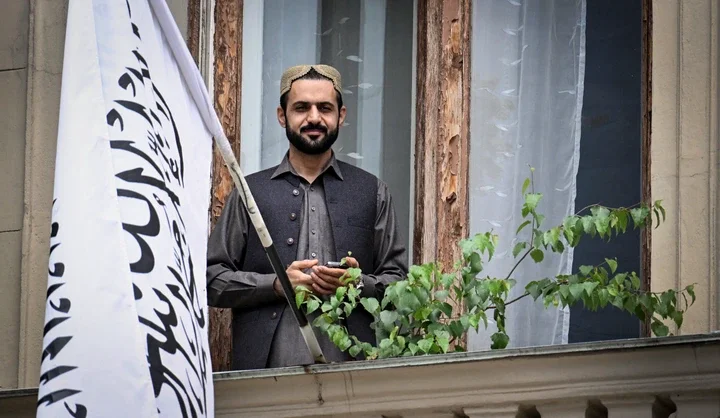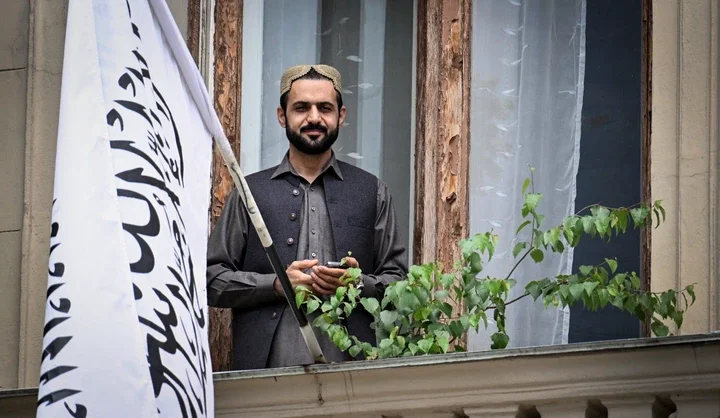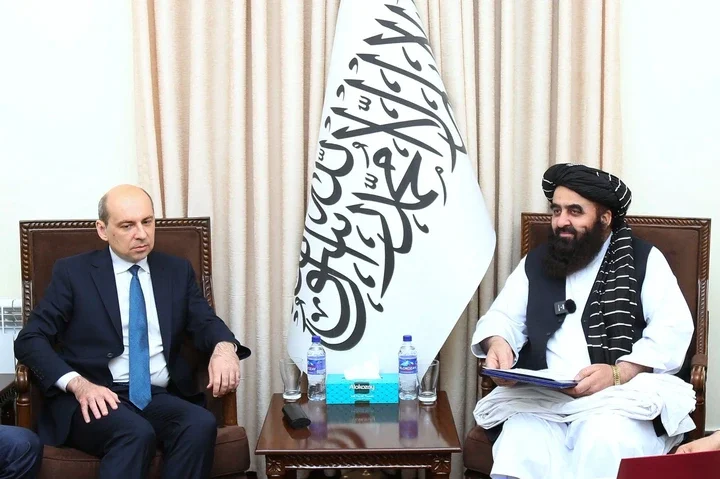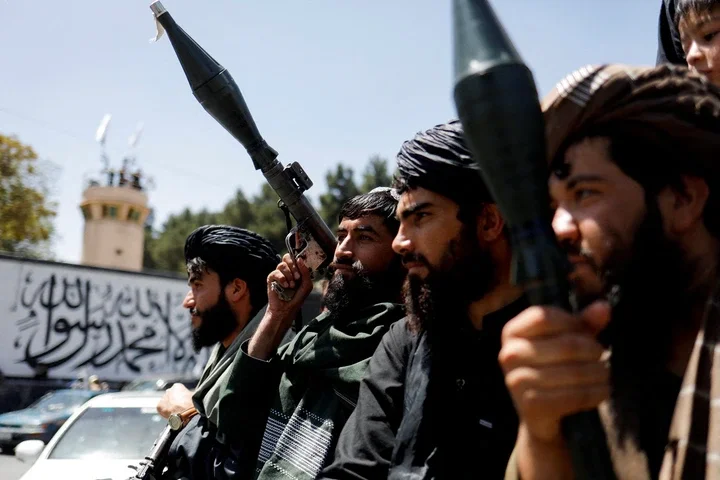Russia becomes first country to recognise Afghanistan’s Taliban regime. Will China follow?

Experts monitoring the Taliban’s new diplomacy push in Asia say China could follow suit, paving the way for wider recognition of the militant group and ending its pariah status on the world stage. reports
Russia has become the first country in the world to grant official recognition to the Taliban government in Afghanistan, with experts monitoring the situation warning other countries like China could soon follow suit.
Russia’s foreign ministry announced late on Thursday that it had received official credentials from Gul Hassan Hassan, a newly appointed ambassador from the acting government of the Islamic Emirate of Afghanistan to Russia. Mr Hassan Hassan met with the Taliban’s acting foreign affairs minister Amir Khan Muttaqi.
The foreign ministry hailed the official recognition of the Afghan government and said it will allow “productive bilateral cooperation” between the Taliban and Moscow.
“This brave decision will be an example for others … now that the process of recognition has started, Russia was ahead of everyone,” Mr Muttaqi said after meeting Russian officials.
No other country has formally recognised the Taliban government. However, China, the United Arab Emirates, Uzbekistan and Pakistan have all designated ambassadors to Kabul, in a step towards recognition.
The first photos of the celebrations by the former militants showed them waving the Islamic Emirate’s white and black flags and offering prayers in the balcony of the Afghanistan embassy in Moscow.

Zabiullah Mujahid, the chief spokesperson of the Taliban government in Afghanistan, welcomed the move and said he hoped more nations will now identify them as the official leader of Afghanistan.
“The Islamic Emirate of Afghanistan is grateful to Russia for this act. We call on other countries to follow the same path to build a better and stronger relationship of recognition with us,” Mr Mujahid told The Independent.
The Taliban stormed to power in Afghanistan in August 2021 after the exit of US and Nato forces and promised a moderate rule in the country. But shortly after taking control, the Taliban banned girls and women from schools above sixth grade, colleges, and workplaces.
What followed was stricter and harsher implementation of the Taliban’s interpretation of Islamic Sharia law, under which girls and women are still banned from public spaces, salons, national parks and gymnasiums, among other places.
The Taliban were shunned on the international stage due to their “gender apartheid policies” and Western diplomats and officials earlier said the isolation would continue until it changed course on women’s rights. Russia removing the “terrorist” tag from the group and recognising them as the official rulers of Afghanistan is being seen as a major step towards ending that isolation – even though the situation for Afghan women has not changed.

Taliban leaders have travelled to Russia and China and held high-level talks with many other countries to build diplomatic ties, all part of an effort to seek international legitimacy.
Moscow’s decision to upgrade its relationship with the Taliban was made by Russian president Vladimir Putin on advice from foreign minister Sergei Lavrov, said Russia’s ambassador to Afghanistan Dmitry Zhirnov.
What does Putin gain from the Taliban?
Russia has a complex history with Afghanistan. Soviet troops invaded the country in December 1979 to prop up a Communist government, but became bogged down in a long war against mujahideen fighters armed by the US. Soviet leader Mikhail Gorbachev pulled his army out in 1989, by which time some 15,000 Soviet soldiers had been killed.
Russia has been gradually building relations with the Taliban, which Mr Putin said last year was now an ally in fighting terrorism. Since 2022, Afghanistan has imported gas, oil and wheat from Russia. The Taliban was outlawed by Russia as a terrorist movement in 2003, but the ban was lifted in April this year. Russia sees a need to work with Kabul as it faces a major security threat from Islamist militant groups based in a string of countries from Afghanistan to the Middle East.
“Of course, Moscow seeks to establish closer economic ties with Kabul. Russia is pursuing a number of infrastructure projects, in which Afghanistan could play an important role. For example, Russia is promoting transport corridors that are expected to run through Afghan territory,” said Aleksei Zakharov, fellow with Strategic Studies Programme at New Delhi-based think tank Observer Research Foundation (ORF).

But to achieve success in these projects alongside the Taliban, Moscow will first need to get a grip on the security situation in Afghanistan. Several terrorist groups, including Isis’s regional outfit Isis-K, have carried out attacks in the country against foreign contingents.
“It’s still an open question if Russia can get anything in return for IEA’s official recognition,” says Mr Zakharov, suggesting this could prove to be a risky bargain for the Kremlin.
“The Taliban are not in a position to provide any guarantees against future attacks. Their track record on fighting terrorism has been mixed,” he said.
In March 2024, gunmen killed 149 people at a concert hall outside Moscow in an attack claimed by Isis. US officials said they had intelligence indicating it was the Afghan branch of the group, Isis-K, that was responsible. The Taliban said it was working to wipe out the presence of Isis in Afghanistan.
Will China follow suit?
“As a traditional friendly neighbour of Afghanistan, the Chinese side has always believed that Afghanistan should not be excluded from the international community,” Chinese foreign ministry spokesperson Mao Ning said on Friday, after Russia’s recognition of the Taliban.
“No matter how the internal or external situation changes in Afghanistan, diplomatic relations between China and Afghanistan have never been interrupted,” she said.
The Taliban’s soldiers have been celebrating on social media. “The next in line to recognise the Islamic Emirate will be all the other members of BRICS, InshaAllah. Cry, enemies!” said a Taliban supporter on X, referring to Brazil, Russia, India, China, and South Africa’s coalition.
Russia’s decision “would pave a clearer way for China at least to officially recognise the government in Kabul”, said Kabir Taneja, deputy director and fellow at Strategic Studies Programme at the ORF in New Delhi. “Others may still be wary. For Russia, this may have been expedited due to the Ukraine war and the ISKP-led terror attack in Moscow in April 2024.”
The Middle East will be a “little more sceptical”, he told The Independent. “However, it is possible that normalisation of Ahmed Al Sharaa in Syria will pave an easier path more specifically for Arab powers to normalise the Taliban as well,” Mr Taneja said, referring to Syria’s president – a former al-Qaeda militant.
Senior authorities on Afghanistan, however, continued to warn against the risk of colluding with the Taliban at the expense of Afghanistan’s women and girls. David Loyn, author of The Long War and a senior expert on Afghanistan, cautioned: “There is no plan as to how to move forward to save Afghan women.
“The best thing from this could be if the US and other Western countries sat up and took notice that Russia is cozying up to the Taliban, who harbour al-Qaeda and run a terrorist state,” Mr Loyn told The Independent.
“And we know what happens when Afghanistan is ignored. The consequences were 9/11,” Mr Loyn warned.





